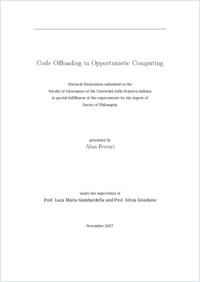Code offloading in opportunistic computing
- Ferrari, Alan
- Gambardella, Luca Maria (Degree supervisor)
- Giordano, Silvia (Degree committee member)
-
28.11.2017
110 p
Thèse de doctorat: Università della Svizzera italiana, 2017
Code offloading
Computation offloading
Opportunistic computing
Bayesian network
Smart phones
Energy consumption
Mobile Computing
Energy leak detection
Cloudlet
English
With the advent of cloud computing, applications are no longer tied to a single device, but they can be migrated to a high-performance machine located in a distant data center. The key advantage is the enhancement of performance and consequently, the users experience. This activity is commonly referred computational offloading and it has been strenuously investigated in the past years. The natural candidate for computational offloading is the cloud, but recent results point out the hidden costs of cloud reliance in terms of latency and energy; Cuervo et. al. illustrates the limitations on cloud-based computational offloading based on WANs latency times. The dissertation confirms the results of Cuervo et. al. and illustrates more use cases where the cloud may not be the right choice. This dissertation addresses the following question: is it possible to build a novel approach for offloading the computation that overcomes the limitations of the state-of-the-art? In other words, is it possible to create a computational offloading solution that is able to use local resources when the Cloud is not usable, and remove the strong bond with the local infrastructure? To this extent, I propose a novel paradigm for computation offloading named anyrun computing, whose goal is to use any piece of higher-end hardware (locally or remotely accessible) to offloading a portion of the application. With anyrun computing I removed the boundaries that tie the solution to an infrastructure by adding locally available devices to augment the chances to succeed in offloading. To achieve the goals of the dissertation it is fundamental to have a clear view of all the steps that take part in the offloading process. To this extent, I firstly provided a categorization of such activities combined with their interactions and assessed the impact on the system. The outcome of the analysis is the mapping to the problem to a combinatorial optimization problem that is notoriously known to be NP-Hard. There are a set of well-known approaches to solving such kind of problems, but in this scenario, they cannot be used because they require a global view that can be only maintained by a centralized infrastructure. Thus, local solutions are needed. Moving further, to empirically tackle the anyrun computing paradigm, I propose the anyrun computing framework (ARC), a novel software framework whose objective is to decide whether to offload or not to any resource-rich device willing to lend assistance is advantageous compared to local execution with respect to a rich array of performance dimensions. The core of ARC is the nference nodel which receives a rich set of information about the available remote devices from the SCAMPI opportunistic computing framework developed within the European project SCAMPI, and employs the information to profile a given device, in other words, it decides whether offloading is advantageous compared to local execution, i.e. whether it can reduce the local footprint compared to local execution in the dimensions of interest (CPU and RAM usage, execution time, and energy consumption). To empirically evaluate ARC I presented a set of experimental results on the cloud, cloudlet, and opportunistic domain. In the cloud domain, I used the state of the art in cloud solutions over a set of significant benchmark problems and with three WANs access technologies (i.e. 3G, 4G, and high-speed WAN). The main outcome is that the cloud is an appealing solution for a wide variety of problems, but there is a set of circumstances where the cloud performs poorly. Moreover, I have empirically shown the limitations of cloud-based approaches, specifically, In some circumstances, problems with high transmission costs tend to perform poorly, unless they have high computational needs. The second part of the evaluation is done in opportunistic/cloudlet scenarios where I used my custom-made testbed to compare ARC and MAUI, the state of the art in computation offloading. To this extent, I have performed two distinct experiments: the first with a cloudlet environment and the second with an opportunistic environment. The key outcome is that ARC virtually matches the performances of MAUI (in terms of energy savings) in cloudlet environment, but it improves them by a 50% to 60% in the opportunistic domain.
- Language
-
- English
- Classification
- Computer science and technology
- License
-
License undefined
- Identifiers
-
- RERO DOC 306361
- URN urn:nbn:ch:rero-006-116832
- ARK ark:/12658/srd1318632
- Persistent URL
- https://n2t.net/ark:/12658/srd1318632
Statistics
Document views: 364
File downloads:
- Texte intégral: 353
